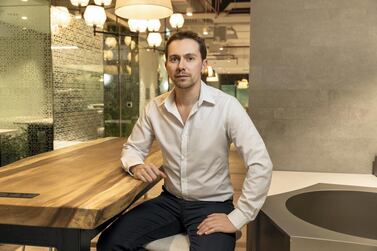Nobody wants to work forever. Even if you enjoy your job, you still want to give yourself the financial independence to quit and do something different if the mood takes you, or if you have no choice.
A new campaign called the Financial Independence Retire Early (Fire) movement, which has a big following in the UAE, has been encouraging people to get themselves retirement-ready as soon as possible.
The UAE's new five-year retiree visas - available to non-Emirati residents over 55 - are set to be rolled out imminently. Under the proposal, first unveiled in September, expatriates can secure the visa if they have an investment property worth at least Dh2 million, or financial savings of Dh1m, or an active monthly income of Dh20,000 or more. The visa is valid for five years with the "possibility" of renewal.
However, you will need a sizeable sum to be fully financially independent by 55, especially as rising life expectancy means you could live for another 40 years or more. But how much do you ensure you live the rest of your life in financial security?
Burning desire
Tuan Phan, a board member of SimplyFI.org, a non-profit community of UAE investment enthusiasts, is a Fire enthusiast but says retiring early does not mean sitting at home with your feet up. "It is more the option to chase your dream without being forced to stay in a job you don’t like because bills have to be paid.”
To retire early, you have to be prepared to make financial sacrifices, and this means more than cutting out the odd brunch. You have to be prepared to save a sizeable chunk of your salary, Mr Phan says, and the more you save, the earlier you will be financially free.

“As a rule of thumb, a 21-year-old who saves 15 per cent of their salary will build a big enough pot to retire at the traditional age of around age 65, without too large a drop in net income. If they can lift that 25 per cent instead, this will allow them to retire 10 years earlier at 55.”
This sounds daunting but UAE residents have the advantage of tax-free earnings. "If they upped their savings rate to 40 per cent of their salary, they could potentially halve the length of their working life," Mr Phan adds.
The earlier you start, the better.
Work to rule
You also have to decide how much money you need to live off in retirement, and something called the 4 per cent rule can give you a rough idea. Financial experts reckon this is the percentage of your retirement savings you can safely withdraw each year without depleting your pot.
So if you have, say, $1 million you can safely take an income of $40,000 a year. If you can live off that, congratulations, you have achieved financial independence.
If your lifestyle demands income of $100,000 a year, then you will need $2.5 million in your pot. This is a highly personal number: it will depend on variables such as your desired lifestyle, financial responsibilities and fixed costs such as debt repayments, Mr Phan says. “If you have other sources of income, such as a rental property, company or state pension, or a side job or hobby that brings in extra income, a smaller pot may be enough.”
Alternatively, you could move to a country with lower living costs. “Popular countries with modern facilities include Portugal, Spain, Thailand, Philippines, Mexico, Colombia and Costa Rico," says Mr Phan.
You can also be flexible about that 4 per cent. “You could take 3 per cent a year but increase that by, say, 1 per cent every year the stock market rises, say, 5 per cent, boosting your pension. Boom years will allow exotic vacations while slower years mean a pizza in front of Netflix," he adds.
Making a million
Tom Anderson, senior investment manager at Killik, a London-based adviser with clients in the UAE, says once you have set yourself a financial target work back to see how much you need to put away each month to achieve that.
You are unlikely to succeed by leaving your money in a savings account earning around 1 per cent, Mr Anderson says. “You will need to invest in higher-risk, higher-return assets such as stocks and shares, corporate bonds and property. Of these, shares have performed best with an average long-term return of around 5.5 per cent a year, despite the added volatility.”
Mr Anderson says that if you started off with $20,000 in your portfolio then paid in another $1,000 every month and your money grew at an average 5.5 per cent a year after charges, you should hit the $1 million mark in 30 years.
If your money grew at just 1 per cent in the bank, you would have less than half that sum, or £446,972.
You must be prepared to withstand market volatility, although investing regular monthly sums can spread the risk, as your monthly payment picks up more stock when the market drops.
Start early
Patrick Connolly, certified financial planner at UK independent financial advisory firm Chase de Vere, has made similar calculations, although assuming 6 per cent annual growth after charges. These suggest that someone who started saving from scratch at the age of 20 would need to pay in $500 a month to hit a million by age 65.
This rises to $900 a month if you saving at age 30, then $1,650 if you leave it to 40, and finally, a hefty $3,550 a month starting at 50.
Your earliest contributions are the most valuable, because they have longest to grow, Mr Connolly says. "The later you leave it, the harder it gets because compound interest has less time to work its magic.”
Spread the risk
You can continue to leave your money invested after you have hit your savings target in a portfolio of dividend-paying stocks, mutual funds or exchange traded funds (ETFs), taking the dividends as income.
If you can generate income of 4 per cent a year after charges, you may not even have to touch your capital at all.
However, Stuart Ritchie, head of wealth management at AES International, says focusing exclusively on dividend stocks can be risky. “The danger is that you will have too much exposure to a few sectors that pay healthy dividends, such as utility companies or banks, and miss out on growth opportunities elsewhere.”
If those sectors fall out of favour, your pension could take a hit. “Build a well-diversified portfolio with a range of asset classes to spread risk. Also remember that dividends can be cut, for example, General Electric cut its payout by 50 per cent in 2017.”
Those relying on rental income property to top up their pension must allow for expenses such as void periods, management costs, property maintenance and local taxation, Mr Ritchie adds.
Finally, there is one simple pension rule that everybody should follow. How much should you save for retirement? As much as you can afford.








